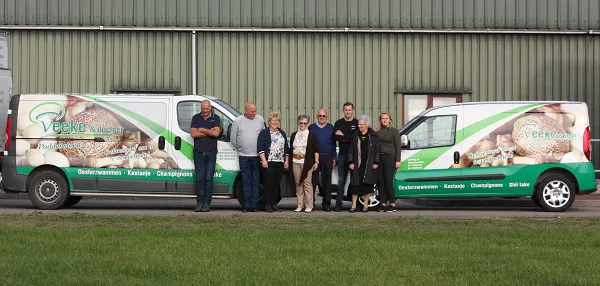The Dutch hospitality industry shut down in March. That was a bitter pill for Iris Veeke of Veeke Paddenstoelen to swallow. “As a mushroom grower, you work with programs that are determined three weeks in advance. We, therefore, didn’t know what to do with the new mushroom crop. The hospitality industry couldn’t take them."

"That's our primary target market. We send very little to wholesalers. At the time, it would, of course, have been shameful to throw all of those mushrooms away. So, we tried to sell as many as possible to the food bank and via other channels. But, considering the volumes we deal with, it was inevitable that some would end up in the bin.”
Now that summer’s over; things are slowly picking up again. “It’s still not what it used to be. But it’s heading in the right direction, especially since it’s September. That’s usually our best month of the year. However, even in the summer, we saw mushroom sales were improving," says Iris.
"Although not this year, but many catering companies want mushrooms to barbeque as meat replacers. You can do more with mushrooms too. And, at the same time, the range has expanded in recent years. We sell not only the traditional white mushrooms; we also have chestnut, portobello mushrooms, oyster, and other mushrooms. So, we can provide our clients with the entire package.”
There might be a rising demand and a wider range of products. But, growers’ prices remain the same, while the cost price continues to climb. “Your company could focus on adding value. But, sometimes, cuts are also effective," explains Veeke. "For example, we’re installing solar panels on the cells’ roof. That will save on energy costs. We’re also looking at getting tilting beds. Then we can increase labor productivity and, so, will then need fewer people. After all, staffing is a company’s most expensive cost item. Workers will become increasingly scarce in the future too."
"Besides these two developments, we’re also constructing a new nursery. Part of our production will be located at a different site. This will streamline our company’s logistics. These kinds of initiatives provide gains for us. Quality labels in the mushroom sector may be well-intentioned. But, unfortunately, these mean very little to us. It may be important in the Dutch market. However, many Dutch companies export their mushrooms, and those markets don’t consider quality labels,” concludes Iris.
 Veeke Paddenstoelen
Veeke Paddenstoelen
Vlietweg 4b
4758 TJ
Standdaarbuiten
T: 0610039761 or 0610039732
info@veekepaddenstoelen.nl
www.veekepaddenstoelen.nl
